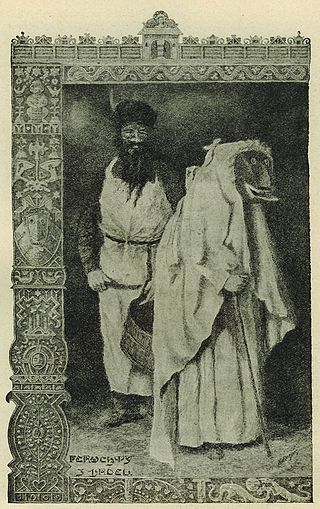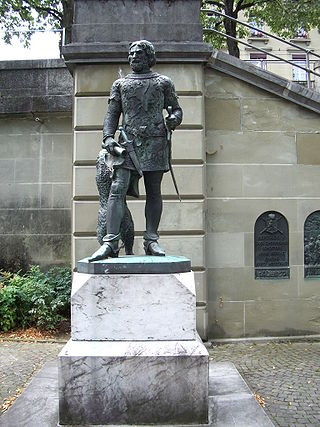See also
- Perchta, a goddess in Alpine paganism
- Berchtoldstag
Berchtold (also Berthold, Bertold, Bertolt) is a Germanic name from the Old High German beruht ('bright' or 'brightly') and waltan ('rule over'). The name came into fashion in the German High Middle Ages from about the 11th century. The cognate Old English name is Berhtwald or Beorhtwald, attested as the name of an archbishop in the 8th century. Berchtold was also the name of the leader of the Wild Hunt in German folklore of the 16th century. The name here replaces the female Perchta.
Notable people with the name or variants include:
Sigismund is a German proper name, meaning "protection through victory", from Old High German sigu "victory" + munt "hand, protection". Tacitus latinises it Segimundus. There appears to be an older form of the High German word "Sieg" (victory): sigis, obviously Gothic and an inferred Germanic form, and there is a younger form: sigi, which is Old Saxon or Old High German sigu. A 5th century Prince of Burgundy was known both as Sigismund and Sigimund . Its Hungarian equivalent is Zsigmond.
Arnulf is a masculine German given name. It is composed of the Germanic elements arn "eagle" and ulf "wolf". The -ulf, -olf suffix was an extremely frequent element in Germanic onomastics and from an early time was perceived as a mere suffix forming given names. Similarly, the suffix -wald, -ald, -old, originally from wald "rule, power" underwent semantic weakening. Therefore, the name Arnulf and Arnold were often conflated in early medieval records, as is the case with bishop Arnulf of Metz, especially as the final consonant came to be dropped (Arnoul).
Adalbert is a German given name which means "noble bright" or "noble shining", derived from the words adal and berht. Alternative spellings include Adelbart, Adelbert and Adalberto. Derivative names include Albert and Elbert.
Olaf or Olav is a Dutch, Polish, Scandinavian and German given name. It is presumably of Proto-Norse origin, reconstructed as *Anu-laibaz, from anu "ancestor, grand-father" and laibaz "heirloom, descendant". Old English forms are attested as Ǣlāf, Anlāf. The corresponding Old Novgorod dialect form is Uleb. A later English form of the name is Olave.

Gertrude of Merania was Queen of Hungary as the first wife of Andrew II from 1205 until her assassination. She was regent during her husband's absence.
Bert is a hypocoristic form of a number of various Germanic male given names, such as Robert, Albert, Elbert, Herbert, Hilbert, Hubert, Gilbert, Wilbert, Filbert, Fulbert, Norbert, Osbert, Roberto, Roberta, Bertram, Berthold, Bertrand, Umberto, Humbert, Humberto, Alberto, Alberta, Albertine, Albertina, Cuthbert, Delbert, Dagobert, Rimbert, Egbert, Siegbert, Gualbert, Gerbert, Lambert, Engelbert, Bertie, and Colbert.

Perchta or Berchta, also commonly known as Percht and other variations, was once known as a goddess in Alpine paganism in the Upper German and also Austrian and Slovenian regions of the Alps. Her name may mean 'the bright one' and is probably related to the name Berchtentag, meaning 'the feast of the Epiphany'. Eugen Mogk provides an alternative etymology, attributing the origin of the name Perchta to the Old High German verb pergan, meaning 'hidden' or 'covered'. The exact origin or time of origin is unknown.

"Frau Holle" is a German fairy tale collected by the Brothers Grimm in Children's and Household Tales in 1812. It is of Aarne-Thompson type 480.
Berthold may refer to:
Ælfwine is an Old English personal name. It is composed of the elements ælf "elf" and wine "friend", continuing a hypothetical Common Germanic given name *albi-winiz which is also continued in Old High German and Lombardic as Albewin, Alpwin, Albuin, Alboin. Old Norse forms of the name are Alfvin and Ǫlfun. The modern name Alwin may be a reduction of this name, or alternatively of Adalwin, the Old High German cognate of the Anglo-Saxon Æthelwine. The name of the elves is clearly of Common Germanic age. As an element in given names, it is not found in the earliest period, but it is well attested from the 6th century and extinct by the Late Middle Ages.

Berchtoldstag is an Alemannic holiday, known in Switzerland and Liechtenstein. It is near New Year's Day, during the Rauhnächte, in Switzerland nearly always on 2 January, with the status of a public holiday in a number of cantons. Its observation is attested since the 14th century, although celebrations were limited after the Protestant Reformation.

Berthold V, Duke of Zähringen, also known as Bertold V or Berchtold V, was Duke of Zähringen from 1186 until his death. He was the son of Berthold IV and Heilwig of Frohburg.
Thorsten is a Scandinavian given name. The Old Norse name was Þórsteinn. It is a compound of the theonym Þór (Thor) and steinn "stone", which became Thor and sten in Old Danish and Old Swedish.
The surname Berthold may refer to:
Burchard are both Germanic given names and surnames, from Burg "castle" and hart "hard". Notable people with the name include:
Rostagnus is a Latinization of a Germanic given name common in the Middle Ages, especially in Occitania. It derives from Proto-Germanic *Hrōþi- "fame" and *stainaz "stone". It is attested in the Old High German form Hruodstein.
Berchtold von Falkenstein was abbot of the Benedictine Abbey of Saint Gall from 1244 until 1272.
Bertold may refer to:
The Heimchen is a being from German folklore with several related meanings.
Berthold is a Germanic given name and surname. It is derived from two elements, berht ('bright') and wald. Variants include Berchtold and Bertolt.